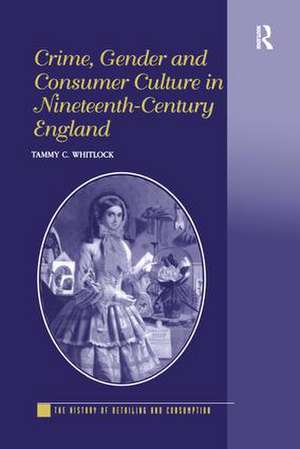Crime, Gender and Consumer Culture in Nineteenth-Century England: The History of Retailing and Consumption
Autor Tammy C. Whitlocken Limba Engleză Paperback – 9 sep 2016
Preț: 469.34 lei
Nou
Puncte Express: 704
Preț estimativ în valută:
89.81€ • 94.02$ • 74.31£
89.81€ • 94.02$ • 74.31£
Carte tipărită la comandă
Livrare economică 05-19 aprilie
Preluare comenzi: 021 569.72.76
Specificații
ISBN-13: 9781138251427
ISBN-10: 1138251429
Pagini: 256
Dimensiuni: 156 x 234 x 14 mm
Greutate: 0.45 kg
Ediția:1
Editura: Taylor & Francis
Colecția Routledge
Seria The History of Retailing and Consumption
Locul publicării:Oxford, United Kingdom
ISBN-10: 1138251429
Pagini: 256
Dimensiuni: 156 x 234 x 14 mm
Greutate: 0.45 kg
Ediția:1
Editura: Taylor & Francis
Colecția Routledge
Seria The History of Retailing and Consumption
Locul publicării:Oxford, United Kingdom
Cuprins
Contents: Introduction. Part I Destroying 'The Nation Of Shopkeepers': Ready money only: small shops and new retail methods; Vanity fairs: the growth of bazaars and fancy fairs; 'Mothers beware!': fraud by the retailer; The culture of fraud and the female consumer. Part II Criminal Consumption: Shoplifting in early 19th-century England; Mrs McGregor's sealskin jacket: female frauds and the art of buying without paying; Solving the problem of the criminal consumer: women and kleptomania. Conclusion; Bibliography; Index.
Notă biografică
Tammy C. Whitlock is Professor of the Department of History at the University of Kentucky, USA.
Recenzii
'Whitlock presents a fascinating picture of capitalism that is never very far from criminality and that created a sphere for buyers and sellers to make handsome profits and suffer great losses.' Victorian Studies 'Whitlock is to be complimented for her uncovering of a fascinating period in the history of retailing. Her use of a range of materials brings a significant contribution to our understandings of the history of consumer society, and she provides an impressive case for a reinterpretation of many of the debates assumed to originate with the emergence of the department store.' Journal of British Studies 'This book unearths much fascinating material... there is much in this book that will be of value to anybody interested in the cultures associated with nineteenth-century retailing and consumption.' Urban History
Descriere
Using an interdisciplinary approach, this book traces the expansion of commodity culture and a mass consumer orientated market, and explores the wider social and cultural implications this had for society. The author emphasizes the key role women played in this evolution and, through a focus on retail crime and individual cases of middle-class shoplifting and fraud, provides the first detailed history of the "kleptomaniac" woman in 19th c. England.















